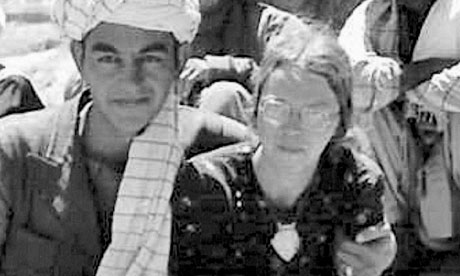
This is not an ordinary collection of poetry. It is Clare Holtham's first and final book – she died in February 2010 – and it contains two-thirds of all the poems she ever wrote. Its appeal is as a record, a souvenir, a putting together of pieces from an extraordinary life. The poems themselves are like green wood. Some are slender, some barely formed – but all have impact. And the collection is all the more precious and intriguing because this is a life that was hard to assemble. In "Pieces", she describes working on a jigsaw – starting with sky. As this poem and others – such as "Peking Album" and "Bristol Blue"– develop, it becomes clear there was one crucial piece missing.
Holtham's childhood was shaped by desertion. Her parents were communists – and it was to Mao's China that her mother disappeared, in 1950, with a "charming Irishman", a fellow activist, leaving two-year-old Clare behind. Holtham lived with her grandfather and then her father for whom she had a "fierce unacknowledged love" – acknowledged now, with tender gravity, in "Sequence for My Father".
At 14, after clashing with her stepmother, she left home and lived rough on London's streets. She briefly attended a school for maladjusted children in Bexhill until she was expelled (for organising a midnight feast on a beach). But she had native wit (in an IQ test, she came top of the Mensa scale). As a child, she had dreamed of getting into Cambridge. As an adult, on the face of it, her chances seemed slight. But here was a woman who could combine working as a bus conductor with teaching herself Persian. When she applied to Cambridge, Newnham recognised her unconventional brilliance and offered her a place.
As a young woman, Holtham travelled to Turkey, Iran, Pakistan and Afghanistan and took many photographs – some of which are included in this fine, observant volume. The most arresting shows her at 23 – a pale, myopic, unsmiling bluestocking next to her new husband: a beatific, turbanned Uzbek chieftain. To say theirs was a temporary union is an understatement: they were married for 24 enraptured hours.
"Anointing" is about their night together – a poem of intimate brevity. Like so many of Holtham's poems, it is personal yet lacks egotism: she makes herself invisible in it. Reeds are given the main role "singing of separation". The wind that ends the poem blew her into another world.
Holtham's writing proceeds from a certainty about what she wants to say. Her elegy "Paso Doble", for her partner Eddie Block (with whom she co-founded the Cambridge film festival and later established Brighton's Duke of York as an arthouse cinema), is a companion piece to the sequence for her father. Both poems are moving because quietly bereft. But it is "Intercalary Days" – about the removal of a brain tumour – that is, appropriately, the most intricately cerebral of her poems: an imaginative, out-of-body, mythical feat.
At one stage, Holtham worked as a computer systems analyst, travelling the world as an IT troubleshooter. It is interesting, given such skills, that in her writing she leant towards simplicity. The more one reads, the more her spare work yields. Memory itself could not be more humble – a trick of the light:
"So fragile a thing is memory –
sunlit flashes
on the dark hill."
The Road from Herat is available to buy from fiveseasonspress.com priced at £9.50 plus £3 UK postage

